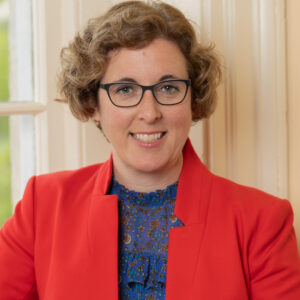Welcoming Shannon Smythe
August 1, 2023 | Faculty, Featured, Field Education, Public

Shannon Smythe has covered a lot of ground since her days as a divinity student at Princeton Theological Seminary.
She has been a scholar, writing extensively on theologian Karl Barth. She has been a professor in the Pacific Northwest, inspiring students with topical courses on women in the church, gender, and contemplative prayer. And more recently, she has taken to the pulpit as a solo pastor, steering struggling congregations in the Northeast toward renewal.
Smythe, Ph.D. ‘13, MDiv ‘06, brings all these experiences to her new role as Director of Field Education and Vocational Placement at Princeton Theological Seminary.
“I understand both the challenges and possibilities that are out there now in the church and in the world,” said Smythe, who started the job last spring. “What I want is for us to always provide the bridge that students can cross when they move from seminary into ministry.”
Smythe’s return to her alma mater comes as the seminary seeks to reimagine and reinvent theological education. A new curriculum introduced in 2021 brings the seminary’s traditional academic excellence and disciplinary rigor to bear on pressing contemporary issues, including the pursuit of racial justice and the formation of inclusive communities.
And last year, the seminary launched two new degree programs, in theology and ecology, and justice and public life.
Smythe said her office plays a pivotal role in executing the seminary’s vision by helping students discern their calling and connect to an expanding range of possible careers. Those could include leading congregations, serving at non-profits, or starting ministries devoted to health care, the environment, or other concerns.
“We are admitting students of a different generation who have a different relationship with the institutional church and with institutions in general,” Smythe said. “There’s exciting innovation and gifts that this new generation of ministry leaders is bringing, and we want to be responsive and supportive, and think deeply about what that means for the way we set up the office.”
One significant change came prior to Smythe’s arrival when the seminary brought field education and vocational placement under one office. The goal is to help ensure that students’ two required field assignments inform their long-term career aspirations. As students enter their fieldwork, they now get courses to enhance their focus and reflection on the experience.
“We are trying to embed field education as part of a larger discernment process toward vocational placement,” Smythe said. “We want to give students a full-scope, full-spectrum experience and to have them start understanding that discernment is a lifelong process.”
Smythe personally knows the value of lifelong discernment.
Her father’s role as a pastor took her family from the Southwest to the Deep South and the Pacific Northwest, allowing Smythe as she grew up to witness the challenges of leading starkly different congregations. She seemed poised for a similar calling, majoring in theology at Seattle Pacific University. But that possibility threatened to create a rift with her theologically conservative parents, who opposed women’s ordination.
“In their tradition, women can be pastors’ wives, they can be missionaries, and they can teach children,” Smythe said.
Conflicted and confused, Smythe found herself drawn to the Presbyterian Church (USA) and Princeton Seminary, where she grew both personally and professionally, including through her encounters with women ministers and leaders.
She then returned to Seattle Pacific as an assistant professor, where she found inspiration in teaching a new generation of undergraduate and seminary students.
Then in 2017, Smythe became an ordained minister. She brought all her skills, experience, and empathy to small and struggling PCUSA congregations in New York, New Jersey, and Delaware.
“You are navigating this fine balance between bringing comfort (to the congregations) and helping them become more self-aware,” she said. “I wanted them to ask themselves: ‘What does vital ministry look like today, and are we doing that, or not?”
Now, she is eager to share her insights and breadth of experience with students at Princeton Seminary.
“It’s a gift and a blessing to be at my alma mater,” Smythe said. “And I trust in God that I can put my own experience to good use in service to the mission of this institution and to the students in their journey of discernment.”





